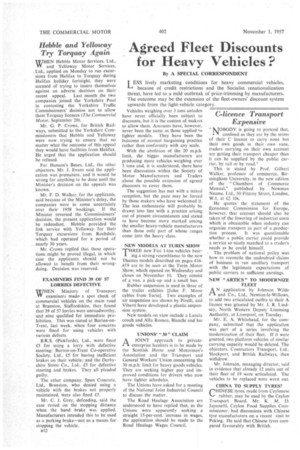C-licence Transport Expensive
Page 46

If you've noticed an error in this article please click here to report it so we can fix it.
NOBODY is going to pretend that, confined as they are by the terms of their C licence to carry none but their own goods in their own vans, traders carrying on their own account are getting their transport cheaper than it can be supplied by the public carrier, by rail or by road."
This is stated by Prof. Gilbert Walker, professor of commerce, Birmingham University. in the new edition of the "Chambers of Commerce Manual," published by Newman Neame, Ltd., 50 Fitzroy Street, London, W.I. at £2 10s.
He quotes the statement of the Economic Commission for Europe, however, that account should also be taken of the lbwering of industrial costs which is obtainable when industry can organize transport as part of a production process. It was questionable whether a public carrier could provide a service so nicely matched to a trader's needs as he could himself.
The problem of national policy was how to reconcile the undoubted claims of business to run ancillary transport with the legitimate expectations of public carriers to sufficient earnings.
AN application by Johnson Wilde and Co., Ltd., Newton-le-Willows, to add two articulated outfits to their A licence was granted by Mr. J. R. Lindsay, North Western Deputy Licensing Authority, at Liverpool, on Tuesday.
Mr. E. A. Whitehead, for the company, submitted that the application was part of a series involving the modernization of their fleet. If it were granted, two platform vehicles of similar carrying capacity would be deleted. The objectors. Contractors Transport, Ltd., Stockport, and British Railways, then withdrew.
Mr. Johnson, managing director, said in evidence that already 12 units out of their fleet of 19 were articulated. The vehicles to be replaced were worn out.
CHINA TO SUPPLY TYRES?
CHINESE tyres, made from Ceylonese rubber, may be used by the Ceylon Transport Board. Mr. K. M. D. Jayanetti, Ceylon Food Supplies Commissioner, had discussions with Chinese tyre manufacturers on a recent visit to Peking, He said that Chinese tyres compared favourably with British.
























































































































